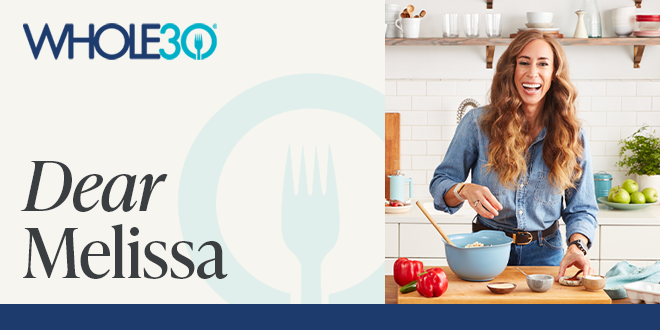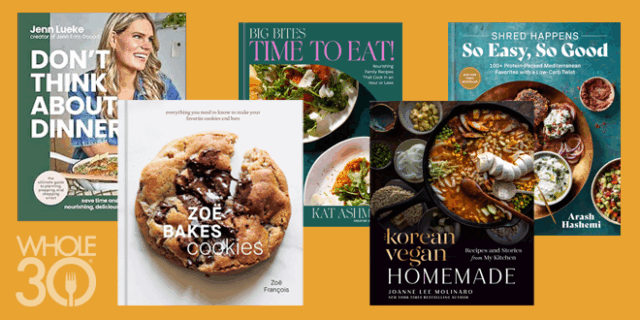Dear Melissa,
We’re coming up on holiday party season, and I’m determined not to spend this one feeling like crap. I have a hard time saying no in general, but it feels even harder when the host is standing in front of you, waiting for you to eat the appetizer. Or your boss just hands you a bottle of beer in front of everyone. Or your mother-in-law insists you try her cookies (which always have gluten). I want to be festive, but I also don’t want to spend the whole month feeling sluggish, bloated, and achy. Help me work my Food Freedom plan and hold my boundaries without hurting anyone’s feelings! -Chronic People Pleaser
Hi People Pleaser,
Any social situation involving food or alcohol can feel challenging. You want to be a gracious and appreciative guest. You also have to prioritize your health and happiness. Often, that means saying no, which is hard enough for some. But saying “no” during the holidays adds even more pressure when the vibes are “YOLO” and someone is standing right there expecting you to accept.
Let’s create a plan of action before you hit the party. Then we’ll practice some simple boundary phrases to help you feel more relaxed and confident. But first, a quick reminder:
Mostly, nobody cares
Most people at your holiday gathering won’t care what you are eating or drinking. It’s highly likely people aren’t even paying attention! Your fellow guests are mingling, talking, and enjoying themselves. They’re not spying on what is or isn’t on your plate. It may feel like everyone is watching, but how realistic is that? Think back to the last time you attended someone else’s party. Ask yourself, “Did I notice which foods my neighbor/friend/Aunt Sara declined to eat?”
Even if the host does notice (because they’re the one offering), they have a dozen other guests to attend to. If you say no thanks, they’ll just move on and continue their hosting duties. Think about the last time you hosted a gathering. Did you spend the night upset because that one neighbor didn’t want a brownie? (I hope not!)
“But Melissa,” you might say, “my friend/mother-in-law/boss will notice, and would take it personally.” Yep, sigh. There will always be people who make your polite and reasonable “no” all about them. They may even try to guilt, pressure, or cajole you into eating something you really don’t want. This is especially uncomfortable in social situations, and may be the entire reason you sent me this question.
I’ll give you a strategy for them, too. Just remember, these folks are outliers. Ninety-nine percent of the time, nobody even notices—and if they do, they won’t give it a second thought. (That should take a little pressure off.)
Now let’s talk about your holiday party Food Freedom plan. You want to enjoy those foods or drinks that are worth it, gracefully say no to those that aren’t, and feel as good as you want to feel all season long. That is 100% achievable! Drawing on Food Freedom Forever and The Book of Boundaries, here is the strategy I’d outline for you.
Have a mental “no thank you” list
Before you arrive at the party, mentally review the foods or drinks you know won’t be worth it for you. For me, that’s any form of alcohol; it’s never worth the headache and terrible sleep. Maybe yours is cheese, or gluten, anything with tomatoes. If you know a specific food or food group will give you digestive distress, swollen joints, migraines, or eczema, that goes on your “no thank you” list. Reasons you may add something to this list:
- Food allergies
- Foods sensitivities
- Sobriety/recovery
- Observing faith-based food practices
- Anything that affects your sleep, energy, or mood (like sugar, alcohol, or caffeine)
- Anything that interferes with medication
Your list may also include foods you just don’t like! I hate eggnog, whether it’s got alcohol or not. My husband despises cooked apples, like in a pie or cobbler. Remember, “I don’t like it” is a good enough reason to say no! Reminding yourself of this can help you answer confidently, even if everyone around you is enjoying the eggnog or pie.
It’s also possible that you won’t have anything on your “no thank you” list. If you don’t have allergies, sensitivities, or special circumstances, you may have the flexibility to say yes or no. This could also be true if your food sensitivities aren’t serious, or if you can avoid negative consequences by having just a little or taking a digestive enzyme.
Know what you’re eating
It’s often helpful for your decision-making to know what’s in the foods being offered. You can do so politely with questions like, “That salad looks delicious, is that goat cheese?” or, “That smells amazing, is that pork or beef?” You may also want to inquire if the punch has alcohol, or if there are breadcrumbs in the meatballs.
You don’t have to go into detail as to why you’re asking. The host will infer that ingredient may not work for you, and that you’ll be making a decision based on their answer. However, if your reason for asking is more serious than preference, do share that. “Are there breadcrumbs in the meatballs? I can’t have gluten,” or “I’m in recovery, so I’m looking for something non-alcoholic.”
If it’s on your “no thank you” list
If you don’t want the food or drink for any reason, the easiest thing to do is… skip it! Don’t serve yourself any, pass the dish to the next person if it comes your way, or choose a can of Waterloo instead of the punch. If someone (like the host) is specifically offering you something, just say, “No thanks.” Keep it simple! Just politely decline, then move on with your conversation or food selection.
If you’re a people pleaser, I understand that “no, thanks” might feel abrupt. I promise, it’s not, especially at a gathering. When it comes to food and drink, “no, thank you” really is all you have to say. However, if you feel the need to follow up or the host persists in asking, keep that simple too.
- “I’m gluten-free, but thanks.”
- “I’m not drinking right now.”
- “I’m not a fan of goat cheese.”
- “I’m saving room for (other appetizer).”
Here’s where we start to talk about guilt, peer pressure, or cajoling. Sometimes, “no thanks” isn’t enough. If the person offering continues to insist, you’ll have to be more firm.
- “One is my limit, but thanks.”
- “Gluten/dairy/peanuts make me sick, so unfortunately, I can’t.”
- “I really don’t like goat cheese, so no thanks.”
Other general phrases that are hard to argue with are, “I’m full, thanks,” or “I really couldn’t eat another thing,” or “I wish I liked goat cheese, thanks though,” or “I’m not in the mood for dessert.”
If they continue to persist, you’ll need a more robust strategy. For more word-for-word scripts to help you navigate social situations, food, drink, and more, see The Book of Boundaries.
Ask yourself, “Is it worth it?”
If you might want the food or drink, I still don’t want you to say yes automatically. It’s always a good practice to check in with yourself and ask, “How do I feel, and what do I want?” Gluten works just fine for me in moderate doses, but I don’t always want dessert, especially if it’s getting late. (I sleep terribly on a fully stomach.) You may enjoy a glass or two of wine, but aren’t sure if it’s worth it, given you have to work the next morning.
If it’s not a, “hell yes,” you can either delay your answer or say no conditionally. Use that time and space to decide if the rough sleep from the cake or headache from the wine will be worth it. Try:
- “Not right now, but I may come find you later.”
- I’m going to wait and see how I feel.”
- “I’m going to hold off on dessert for a bit.”
- “I’m going to have a glass of water first, then I’ll let you know.”
If you decide it’s not worth it or you just don’t want it, don’t circle back! But if they do offer again, return to your polite, “No, thank you.” You could also say something like:
- “I don’t need seconds, it turns out.”
- “I’ve been grazing all night; I think I’m done.”
- “I don’t have room for dessert.”
- “I’m going to stop at one tonight.”
And after all of that, if it does seem worth it, and you do want it, then accept and enjoy! Yes, this part is that easy too. If it’s worth it, it’s worth it! Savor the experience, whatever that looks like. Maybe it’s one, maybe it’s three, maybe it’s, “I have to stop but I wish I could eat more.” It’s your Food Freedom plan.
It’s not personal
Since you specifically worry about hurting your host’s feelings, let’s talk about that some more. If they’re offering something that you know won’t make you feel good, please decline. Your health takes priority over someone else’s in-the-moment feelings. Most of the time, your host isn’t going to be mad or upset. They didn’t know. It’s not personal. It’s not their fault, or yours. Taking care of your own well-being isn’t an offensive action. (And if they choose to take it personally, that’s on them.)
The same goes for something you just don’t like or want. Not everyone is a fan of shrimp, blue cheese, or eggnog. Your host knows this. Your individual tastes and desires also aren’t personal. It would be less kind to accept something you don’t like, then have to lie your way through enjoying it.
Remember, your needs and feelings matter just as much as your host’s. You can and should hold your own boundaries around whatever foods or drinks you know aren’t serving you. The more you practice, the easier this will feel. And food and drink is the best area to practice your boundary skills! Nobody can make you eat something you don’t want, so holding this boundary is relatively easy.
If this seems like overkill
For those outside of the Whole30 community, you may read this and think, “OMG Whole30 Lady, this is intense. It’s just a brownie. Lighten up.”
In some cases, I agree! This is a whole lot of plan for what might amount to a one-hour holiday party. Maybe you’re totally comfortable saying no. Maybe you don’t want to analyze what you’re eating or drinking, because it’s the holidays. If you don’t need this kind of robust step-by-step to stay eat, drink, and stay happy and healthy this season, stop reading and go have fun!
However, there are plenty of people, Whole30 alumni or otherwise, whose food sensitivities make saying “yes” or “no” a more challenging decision. They may have to choose between declining something their host hand-made, or spending the rest of the night in digestive distress. They may struggle to say no in the face of someone else’s disappointment. If you’ve got food sensitivities and consider yourself a people-pleaser, these scenarios feel even harder.
If this is you, going into the party season with a plan will feel comforting. Practicing different phrases for holding your boundaries will inspire confidence. Knowing exactly how to enjoy the party while feeling your best is reassuring, and will make the season even more enjoyable.
We’re all trying to find our own version of food freedom. We’re all working on setting boundaries around the things that help us feel our best. We all want to keep our relationships healthy. Whether you feel comfortable winging it or take comfort in a step-by-step plan, may your holiday season be merry, bright, and full of good cheer.
XO Melissa















